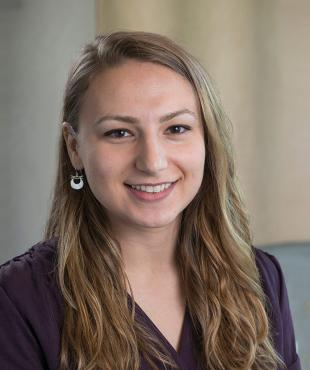
Samantha Moog
Samantha Moog's first job after completing her undergraduate studies was at the National Democratic Institute for International Affairs, and international organization supporting citizen participation and accountability in government worldwide. While Sam connected with some of the values of the organization, she felt disconnected from her work and from the people impacted, sitting behind a desk in Washington, DC.
Throughout college, Sam had enjoyed volunteering with the Burmese refugee community in Vermont. Studying abroad also had a lasting impact on Sam, and her previous internship experiences relating to immigration detention and legal advocacy for asylum seekers in the Middle East largely influenced her academic and professional path. Though Sam has long been interested in migration, specifically forced migration and refugee studies, she was not initially drawn to the social work profession until she later found that many jobs she was interested in were looking for an MSW. When she decided to attend Crown Family School, Sam chose the clinical track and applied to the Global Social Development Practice Program of Study because of the field placements available in agencies working with refugees in Chicago.
For her second-year field placement, Sam worked at Heartland Health Outreach in the International FACES behavioral health program for refugees, asylum-seekers, and survivors of human trafficking. At International FACES, Sam conducted therapy, co-facilitated support groups, case managed, and participated in the intake and assessment process. This placement was crucial for helping Sam think about how her heritage, personal history, and the different identities that she holds come into play in clinical work in cross-cultural or transnational practice. Most of the staff working in FACES come from the communities that they are serving. “It has been important in my clinical development to have been be able to consult, develop, and grow within a community of practice that emphasizes cultural considerations in care. I learned so much from my colleagues about what kind of social worker I want to be.” Sam shared that her supervisor created a community among staff that was “very supportive, process-oriented, and elevated voices from the community we were serving.”
From her start at Crown Family School, Sam knew she wanted to keep up with her Arabic speaking skills and incorporate a global perspective through a learning experience abroad. In the summer between her first and second year, Sam received a Human Rights Fellowship and worked with CARE Jordan’s Urban Refugee Protection Program (URRP) in Amman. CARE Jordan’s URRP has supported urban refugee communities in Jordan for more than two decades, but currently serves mostly Syrian refugees. Her main responsibilities included assisting in program monitoring and evaluation as well as grant writing and reporting. Sam also had the opportunity to work with the psychosocial team, spending time learning from Jordanian, Iraqi, Palestinian, and Syrian staff and volunteers who facilitated peer support groups and women’s and children’s safe space activities. “I learned a lot about international program evaluation and particularly psychosocial programming,” she said. “I learned how to think about mental health from a more culturally informed perspective and about psychosocial concerns of people in different stages of migration and displacement.”
Sam’s classroom experiences have naturally tied into her field work, especially learning from Senior Lecturer Bill Borden and Lecturers Jessica Darrow and Mary Bunn. Bill Borden “emphasizes that we learn through experience and we continue to learn throughout our lives—I appreciate being reminded of the importance of humility, curiosity, and plasticity,” she said. Sam found that Jessica Darrow’s course on the United States’ refugee resettlement policy and practice “allowed me to integrate a lot of what I see and do in the field to larger programs and policies and political and social history.” Mary Bunn’s “Trauma and Resilience in Cross-Cultural Practice” provided Sam with an opportunity to think about conceptions of healing in international, cross-cultural, and transnational practice. “I found it helpful to examine some of the theoretical perspectives that underlie the current discourse on trauma and crosscultural work in the context of my field placement and previous experiences.”
While she may consider working internationally in the future, Sam would like to work with refugee communities in the U.S. after graduation. “Right now, I want to work towards licensure. I’m pretty open to the future!”